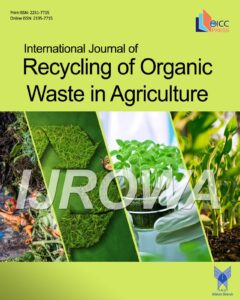Cultivation of sorghum and sunflower in soils with amendment of sludge from industrial landfill
Authors
Abstract
Purpose The purpose of this work was to evaluate the impacts of the amendment of industrial landfll sludge (ILS) in two different soils with cultivation of sunflower and sorghum plants.
Methods The plants grew in two types of soils (Typic Paleudult—TP, and Grossarenic Hapludult—GH) with different doses of ILS (0, 2, 5, 10, and 20 Mg ha−1). The evaluation of the pH, electrical conductivity, available concentrations of P, K, Ca, Mg, and Na, and the hydrolysis of FDA in the soils were tested. The height and dry mass of both plants were measured, as well as the stem diameter of the sunflower. The total concentration of Cu, Cd, Cr, and Pb was evaluated in the plants and soils, in addition to the translocation factor of those in the plants.
Results The amendment of ILS in the soils was efficient to increase the pH and macronutrients, as to increase the biomass production. The largest production occurred with 10 Mg ha−1, and the highest dose (20 Mg ha−1) had negative effects in all treatments. Both plants had low accumulation of Cu, Cd, and Pb in their tissues. Cr increased in the roots of sunflower plants (especially in the TP soil) without translocation to the shoots.
Conclusions The amendment of ILS in soils is an alternative to disposal with benefits to plants and soil quality. TP soil presented better results, being more secure to receive the sludge due to its higher content of clay when compared to the GH soil.



